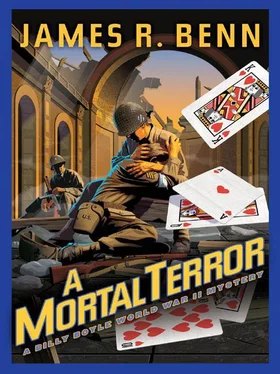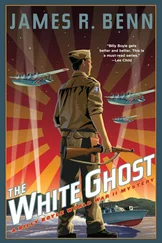James Benn - A Mortal Terror
Здесь есть возможность читать онлайн «James Benn - A Mortal Terror» весь текст электронной книги совершенно бесплатно (целиком полную версию без сокращений). В некоторых случаях можно слушать аудио, скачать через торрент в формате fb2 и присутствует краткое содержание. Жанр: Шпионский детектив, на английском языке. Описание произведения, (предисловие) а так же отзывы посетителей доступны на портале библиотеки ЛибКат.
- Название:A Mortal Terror
- Автор:
- Жанр:
- Год:неизвестен
- ISBN:нет данных
- Рейтинг книги:5 / 5. Голосов: 1
-
Избранное:Добавить в избранное
- Отзывы:
-
Ваша оценка:
- 100
- 1
- 2
- 3
- 4
- 5
A Mortal Terror: краткое содержание, описание и аннотация
Предлагаем к чтению аннотацию, описание, краткое содержание или предисловие (зависит от того, что написал сам автор книги «A Mortal Terror»). Если вы не нашли необходимую информацию о книге — напишите в комментариях, мы постараемся отыскать её.
A Mortal Terror — читать онлайн бесплатно полную книгу (весь текст) целиком
Ниже представлен текст книги, разбитый по страницам. Система сохранения места последней прочитанной страницы, позволяет с удобством читать онлайн бесплатно книгу «A Mortal Terror», без необходимости каждый раз заново искать на чём Вы остановились. Поставьте закладку, и сможете в любой момент перейти на страницу, на которой закончили чтение.
Интервал:
Закладка:
A Mortal Terror
James R. Benn
PART ONE
CHAPTER ONE
Kim Philby owed me one. I’d helped him out back in London, and he told me to ask if I ever needed a favor. Well, now that I needed one, I didn’t hesitate. I wanted to be there when-not if, when-Diana Seaton returned from her mission.
Philby was the only person who could make that happen, so I was glad he was in my debt. As head of the British Secret Intelligence Service’s Mediterranean operations, he controlled all the spies, saboteurs, and agents operating in neutral nations and behind enemy lines from Portugal to Turkey. That included Diana Seaton of the Special Operations Executive, who had been sent into Rome, disguised as a nun, to establish contact with a pro-Allied circle within the Vatican.
How do I, a lowly lieutenant, know all this? Because Diana Seaton is the love of my life, and I worry about her day and night. A lot of people worry about each other in this war, but unlike them, I can do something about it. I work for General Dwight David Eisenhower, which gives me access to secrets out of the reach of most colonels and many generals. The fact that in private I call him Uncle Ike doesn’t hurt either. It allows me to get involved with men like Kim Philby. When Philby called two days ago to tell me he was good for the favor I’d asked, Uncle Ike gave me a five-day leave and told me to stay out of trouble. I’m going to Switzerland, I told him, how much trouble could there be in a neutral country?
As I stamped my feet on the station platform, trying to keep warm, I thought I might have been off the mark. It was cold, and the sun was casting its last feeble yellow rays sideways from the west. I watched the German and Italian border guards, about fifty yards away, their frosted breath trailing like plumes as they walked. Chiasso is a border town, and the railroad runs right through it. The platform stretches from the station on the Swiss side south to the Italian border, marked by a customs house and crossing gate. Philby and I had been waiting an hour, nervously watching the train halted behind the gate, still on Italian soil. Diana was on board, or so I’d hoped, until a half dozen men in leather trench coats entered the train, and a platoon of German soldiers with submachine guns surrounded it. The black locomotive released a sigh of steam from its boiler, as if straining at the leash for the final stretch.
“Gestapo,” Philby had said. “Not to worry. She has good travel papers, signed by the German general commanding rail transport in Northern Italy.”
“The Gestapo can sniff out phony papers, no matter how good.”
“Oh, they’re the real thing, old boy,” Philby said, clenching his pipe between his teeth. “This general is quite the churchgoer, especially since he arranged for the transport of several thousand Italian Jews.”
“To where?” I knew the Nazis were rounding up Jews everywhere, and shooting a lot of them. But I didn’t know where they kept transporting them to, or why. It didn’t make sense when they needed railroads for troops and supplies, but then nothing in this war made much sense.
“To those camps in the east we keep hearing about. This old general began to feel guilty, more so after we landed in Italy. He let it be known he’d be glad to do a small favor for the Vatican now and then.”
“Isn’t it dangerous to give him Diana’s name? Or whatever name she’s using?”
“Yes, it would be,” Philby said absently, as he knocked the ash from his pipe and jammed it into his coat pocket. “That’s why she’s coming out with a group of twenty nuns. Didn’t want to tell you the details before now, you understand.”
“Sure, security. Lot of that going around.”
“The cover story is that they’re being sent to a convent outside of Zurich, to relieve crowding in the Holy See. Solid on all counts. Look there,” he said, pointing to the train. A rush of black leather exited, accompanied by shouted orders. The troops surrounding the train trotted to their vehicles. The Italian border guards stood back, melting into the shadows, mere spectators on their own soil. Two burly Gestapo men stepped down from a train car, holding a civilian by his elbows, guiding him to the waiting sedan. The civilian looked around, his head swiveling wildly as he sought some way out. He dug in his heels, but the two goons carried him easily. Then he dropped, as if he’d fainted. One of the Germans pulled back his leg to give him a kick, and all of a sudden the prisoner was up, pushing his tormentor and twisting free. He ran along the train, his arms pumping, and leapt from the platform, hitting the ground hard, rolling and coming up at a run, limping as one leg threatened to give out. Pistol shots cracked and gray dust kicked up at his feet. Then an MP40 submachine gun sounded, the harsh burst slamming into his back. He took another two steps, perhaps not realizing that death had burrowed into muscle and bone. His momentum propelled him forward, almost in a cartwheel, until his body fell limply across the track. The sigh of steam flowed from the locomotive again, a mournful sound that seemed to apologize for the sudden death of a passenger so close to his final destination.
The Germans pushed the Italian border guards forward, ordering them to retrieve the body. As they grabbed the fellow by his feet and pulled, they left a streak of crimson that pointed, like an arrow, to the Swiss side.
“Lucky fellow,” Philby said. “That was at least quick.”
“One of yours?”
“No. Some poor bastard on the run. Deserter, maybe. Probably betrayed by some other chap looking to save his own skin. Here we go,” he said as the gate was raised and the train finally lurched forward, its giant steel wheels rolling over the bloodstains as it left Nazi territory.
The train arrived at the platform, and lights switched on above us as the sun gave up and set below the looming mountains. To the south, a blanket of darkness settled over occupied Italy, where the blackout was complete, not a glimmer allowed to guide Allied bombers. The Swiss side seemed gaudy in comparison, bright lights shining on gray pavement and orange tile roofs. Maybe I’d gotten used to the blackout in London, but the glare of streetlights and lamps was blinding. I shaded my eyes and strained to see into the compartments as they rolled by, the train moving slowly until its caboose was safely on neutral ground.
The compartment doors opened, and the passengers spilled out with a mix of nervous chatter and ashen faces. Some looked like businessmen, others refugees. Wartime travel to a neutral country provided for odd traveling companions. Then I saw them, two cars down: a procession of black habits, led by an older nun. They wore cloaks against the cold and white wimples encased their faces, their black veils prohibiting sideways glances, their eyes focused on the ground at their feet.
“Hold,” Philby said in a low voice, placing his hand on my arm. “Don’t say anything. We don’t know who may be watching the station.”
I saw her. Not her face, but her walk. Nothing could hide that confident swing of her shoulders, the aristocratic posture, the determined steps. It was Diana, her head bowed a fraction less than the others. The nun in the lead said something in Italian, and they turned to enter the open doors of the station. Diana glanced up, looking in all directions. Her eyes met mine and flashed wide for a split second, then disappeared as she assumed the obedient, demure posture of a nun following her abbess.
Philby and I fell in a few steps behind them as I watched for signs of anyone trailing us. I pulled my hat brim low over my eyes, blending in with the crowd, while trying to spot anyone who didn’t. I was in civilian clothes, and if it hadn’t been for the threat of German agents in similar attire, not to mention the blood on the tracks, I might have talked myself into enjoying this Swiss interlude. Instead, I saw everything with suspicious eyes, not trusting that anyone was who he said he was. I wasn’t, Diana certainly wasn’t, so how could we assume we were surrounded by harmless Swiss neutrals?
Читать дальшеИнтервал:
Закладка:
Похожие книги на «A Mortal Terror»
Представляем Вашему вниманию похожие книги на «A Mortal Terror» списком для выбора. Мы отобрали схожую по названию и смыслу литературу в надежде предоставить читателям больше вариантов отыскать новые, интересные, ещё непрочитанные произведения.
Обсуждение, отзывы о книге «A Mortal Terror» и просто собственные мнения читателей. Оставьте ваши комментарии, напишите, что Вы думаете о произведении, его смысле или главных героях. Укажите что конкретно понравилось, а что нет, и почему Вы так считаете.












